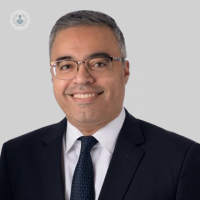Dual diagnosis: What to know about substance abuse and mental health disorders
Written by:Treating substance abuse and addiction issues can be highly complex, particularly as they are commonly inextricably linked with other mental health problems. We invited highly respected psychiatrist Dr Khaled Helmy to shed light on how dual diagnosis, also known as dual pathology, is defined and how mental health conditions and substance use disorder are so often connected. The leading specialist also discusses the recommended treatment approaches for patients with substance abuse and mental health problems.

What is dual pathology and how does it differ from co-occurring disorders?
Dual pathology is usually called dual diagnosis. We often use the term dual diagnosis when a person is experiencing substance use disorder in addition to another mental health disorder.
The term co-occurring disorders differs in that it may describe a diagnosis of two mental health disorders, such as ADHD and anxiety. In addition, co-occurring disorders may relate to a mental health disorder and physical disorder, such as depression with heart problems, for example. A substance use problem with another physical disorder could also be described as co-occurring disorders, whereas dual diagnosis refers to substance misuse and another mental health disorder.
What are the most common types of dual diagnosis?
A common type of dual diagnosis is substance use disorder and adult ADHD. We have found that up to thirty per cent of people with substance use disorder also have adult ADHD. This patient profile can only be helped by assessing and treating the ADHD by prescribing medication in addition to other therapy for the substance use disorder.
Also, anxiety and depression are very common in clients with substance use disorder, especially alcoholism. Sometimes people drink alcohol because they want to control their anxiety or social anxiety. This means that alcoholism, anxiety and low mood very commonly occur together.
Personality issues like borderline personality disorder can also come with substance use disorder. In fact, borderline personality disorder commonly comes with substance use disorder and ADHD. It is also quite common to see people taking Benzodiazepines or sedatives to mask their anxiety and low mood. Sometimes cannabis use can also accompany low mood or ADHD and many people who experience cocaine dependence have adult ADHD.
The treatment of adult ADHD is stimulant. When someone with ADHD is not diagnosed in their childhood and, for one reason or another, they go on to use cocaine, they will find that they are more attentive and focused. While other people feel high, people with ADHD will feel more in control and less anxious and this can become a form of self-medication and so the problem starts. Therefore, it's very important to keep this in consideration when seeing a client with substance misuse. It’s essential to look for the comorbidity as a dual diagnosis, because treating this other condition can help someone to control their substance misuse.
Substance misuse disorder can develop with a mental health disorder but sometimes mental health disorder also can come on as comorbidities with alcohol and drug problems. Therefore, it's very important to find the relationship between both illnesses and to understand which one has come on initially and is more prominent so that we can start to deal with the issues at hand.
What are the treatment challenges and recommended approaches for dual diagnosis?
If someone presents with substance misuse and a mental health disorder, we usually stabilise the substance misuse disorder first. For instance, in someone who is using drugs and is also experiencing a mental health disorder, it’s important to first stabilise the patient’s substance misuse before dealing with the mental health disorder. This allows us to assess the client appropriately as when the person has an active substance use disorder, we will perhaps not get a fair evaluation of their mental health condition.
Therefore, our advice usually starts with the substance misuse, particularly if hard-core drugs are involved, such as drinking too much alcohol or taking heroin or cocaine. However, if someone presents with a mental health disorder who is also a cannabis smoker, it may be more beneficial at that time to assess the patient’s mental health first and treat this as this will perhaps help them to stop smoking cannabis. The healthcare professional will be able to evaluate the best course of action according to the presentation of the client and the severity of their individual case.
You can read more of Dr Helmy’s expert insight about long term outcomes and how best to support a loved one with a dual diagnosis in his other expert article on the topic.
If you wish to schedule a consultation with Dr Helmy, you can do so by visiting his Top Doctors profile.


